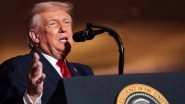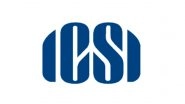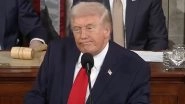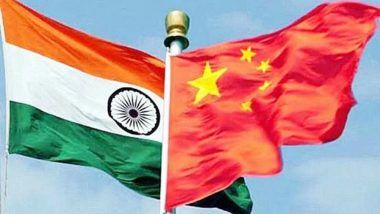Washington, Mar 6:The current India-China border tensions reflect a disturbing trend of growing Chinese aggression and assertion in the region and toward allies and partners of the United States, Biden's pick for top Pentagon policy job, Colin Kahl, has told lawmakers.
In his submission to the members of the Senate Armed Services CommitteeIndia-China during his confirmation hearing for Defence Under Secretary for Policy, Kahal, however, expressed the US resolve to stand by its allies and partners.
“The India-China border tensions reflect a concerning trend of growing aggressiveness and assertiveness by China in the region, including toward allies and partners of the United States,” said Kahl. India-China Border Dispute: Govt in Rajya Sabha Says Emergency Procurement of Certain Arms, Equipments Undertaken by Armed Forces.
“We will, however, continue to stand by our allies and partners and support their ongoing efforts to deescalate the situation. If confirmed, I will continue to monitor the situation closely as both parties work toward a peaceful resolution,” he said, in his written answers to the questions for his confirmation hearing.
The past decade has seen promising trends in the US-India defence trade and technology relationship, he said, adding if confirmed, he will work to sustain these trends, including through a focus on major procurements and high-end technology.
Responding to a question on India, Kahl said if confirmed, he would continue to operationalise India's status as a “Major Defence Partner” by positioning the US and Indian militaries to cooperate more closely to advance shared interests in the Indo-Pacific region.
“To this end, I would support efforts to strengthen interoperability, expand bilateral and multilateral security cooperation across the region and deepen defence trade and technology sharing,” he said.
He added that he would also leverage regular senior-level bilateral and multilateral engagements with likeminded partners to bolster the relationship.
“To continue elevating the US-India partnership, I would prioritise a few promising areas of cooperation. These include deepening information-sharing and mutual logistics operations, growing our defence trade and technology relationship, and expanding high-end cooperation in the maritime domain, including in the Indian Ocean region and southeast Asia,” Kahl said.
“Importantly, I would also seek to expand multilateral cooperation with like-minded partners in the region, including through the Quad, Association of Southeast Asian Nations (ASEAN) mechanisms, and other regional engagements,” he added.
Responding to questions from Senators during his confirmation hearing on Thursday, Kahl said the biggest opportunity is the growing concern and recognition that a more assertive China has produced.
“That is, I think that a lot of our allies and partners are nervous. Frankly, I think that the pandemic and China's early cover-up of the pandemic, and some of its heavy ended, wolf warrior diplomacies during the pandemic have also created opportunities for us to lean in with countries who are increasingly worried about Beijing,” he said.
“I could not agree with you more about the importance of emphasising our alliances and our partnerships. It is one of the biggest asymmetric advantages that the United States has. No other global power has a network of allies and partners that we have. And if I'm confirmed, a huge part of my job will be in nurturing those relationships,” he added.
The United States has enormous opportunities in the Indo-Pacific, he said. “I think that the last administration made some important strides in this area, as did the Obama administration. I think we have opportunities to work not just with our treaty allies like Japan and South Korea and Australia and the Philippines, but with countries like Singapore and Vietnam and others in ASEAN. And I think there are growing opportunities with India. So, I actually think this is an area where we have an enormous possibility,” Kahl said.
Senator Jack Reed, Chairman of the Senate Armed Services Committee said the US must take a long term approach to strategic competition with China, a challenge Defence Secretary Lloyd Austin has appropriately described as the pacing threat for the Department of Defense.
“Competing effectively with China requires that we develop new technologies to rival China's advancements in new operational concepts to ensure the desired effect against Chinese aggression,” he said.
According to Kahl, China is the only country in the world that can challenge the United States systematically that is in the economic domain, the technological domain, the military domain, and frankly, in shaping international order more broadly.
(The above story is verified and authored by Press Trust of India (PTI) staff. PTI, India’s premier news agency, employs more than 400 journalists and 500 stringers to cover almost every district and small town in India.. The views appearing in the above post do not reflect the opinions of LatestLY)













 Quickly
Quickly


